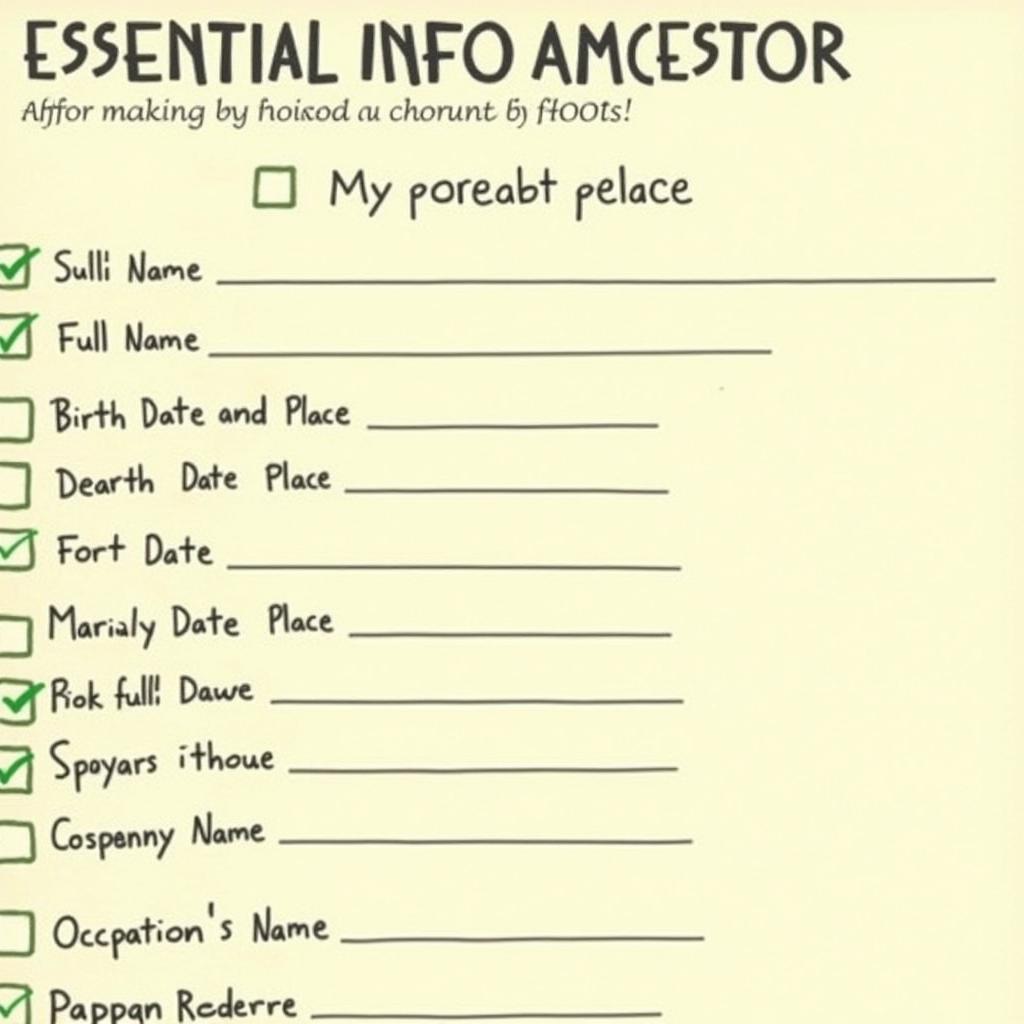Genealogy research can be an exciting journey of discovery, uncovering the stories of your ancestors and piecing together your family’s past. However, without a solid Genealogy Research Checklist, the process can quickly become overwhelming. This guide provides a comprehensive checklist to help you navigate the complexities of genealogical research and maximize your chances of success.
Planning Your Genealogy Research
Before diving into archives and online databases, it’s essential to plan your research. Start by defining your research goals. Are you trying to trace your paternal line back to a specific country? Are you looking for information about a particular ancestor? Knowing what you’re searching for will help focus your efforts. Next, gather any existing family information. Talk to relatives, collect old photographs, and review family documents such as birth certificates, marriage licenses, and obituaries. These resources can provide invaluable clues and starting points for your research.
Building Your Genealogy Research Checklist
A well-organized checklist is crucial for efficient genealogy research. Your checklist should include key information to gather for each ancestor, such as:
- Full name (including maiden names): Crucial for accurate identification.
- Dates and places of birth, marriage, and death: Essential for tracking individuals across time and locations.
- Names of parents, siblings, and spouses: Helps build your family tree and identify potential connections.
- Occupations, residences, and other relevant details: Provides context and insights into their lives.
Organize your findings systematically, using a dedicated notebook, spreadsheet, or genealogy software. This will help you keep track of your sources and avoid duplication of effort.
 Genealogy Research Checklist: Essential Information for Each Ancestor
Genealogy Research Checklist: Essential Information for Each Ancestor
Utilizing Online Resources for Genealogy Research
The internet offers a wealth of resources for genealogy research. Websites like Ancestry.com and MyHeritage provide access to vast databases of historical records, including census records, immigration records, and military records. These records can offer critical information about your ancestors’ lives and help you expand your family tree. Don’t overlook free resources such as FamilySearch, which offers a vast collection of genealogical records and research tools.
Offline Genealogy Research: Exploring Archives and Libraries
While online resources are invaluable, don’t neglect the wealth of information available offline. Local archives, libraries, and historical societies can hold unique records not found online, such as local histories, family Bibles, and cemetery records. Contact these institutions to learn about their collections and research procedures.
Analyzing and Interpreting Your Genealogy Research Findings
Once you’ve gathered information, it’s essential to analyze and interpret your findings critically. Cross-reference information from multiple sources to verify accuracy and resolve any discrepancies. Be aware of potential pitfalls such as common names and variations in spellings. Document your sources meticulously to ensure the credibility of your research.
“Careful analysis of sources is paramount in genealogy,” says renowned genealogist Dr. Eleanor Vance. “Corroborating information from multiple sources ensures the accuracy and reliability of your family history.”
Overcoming Roadblocks in Genealogy Research
Genealogy research can be challenging, and you’re likely to encounter roadblocks along the way. Don’t get discouraged! Seek help from experienced genealogists, join online forums, and attend genealogy conferences to connect with others who can offer guidance and support. “Persistence is key in genealogy research,” adds Vance. “Don’t give up when faced with challenges. Often, the most rewarding discoveries come after overcoming obstacles.”
Conclusion
Using a genealogy research checklist can transform your family history exploration from a daunting task into a rewarding adventure. By following these guidelines and utilizing the resources available, you can uncover the rich tapestry of your family’s past and preserve it for future generations. Remember to start with a clear plan, utilize both online and offline resources, and analyze your findings critically. A well-structured genealogy research checklist will be your invaluable companion throughout this exciting journey.
FAQ
- What is the first step in genealogy research? Gathering existing family information and defining your research goals.
- What are the essential elements of a genealogy research checklist? Full name, dates and places of birth, marriage, and death, names of family members, occupations, and residences.
- What are some useful online resources for genealogy research? Ancestry.com, MyHeritage, and FamilySearch.
- Why is it important to document your sources? To ensure the credibility of your research and allow others to verify your findings.
- What should I do if I encounter roadblocks in my research? Seek help from experienced genealogists, join online forums, and attend genealogy conferences.
- What is the importance of using a genealogy research checklist? It helps organize your research, ensures you collect essential information, and maximizes your chances of success.
- How can I analyze my genealogy research findings effectively? Cross-reference information from multiple sources, be aware of potential pitfalls, and document your sources meticulously.
Need support with your genealogy research? Contact us at Phone Number: 0904826292, Email: research@gmail.com or visit our office at No. 31, Alley 142/7, P. Phú Viên, Bồ Đề, Long Biên, Hà Nội, Việt Nam. Our customer service team is available 24/7. We also offer further resources and articles on our website covering topics such as DNA testing for genealogy and researching specific ethnicities.